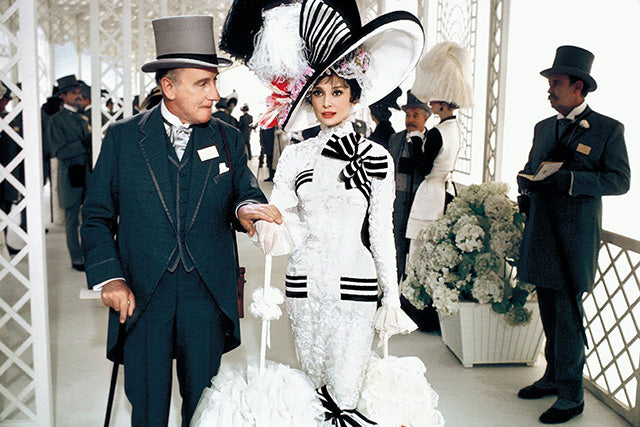50 Years Later: Why My Fair Lady Is Better Than You Remember

I know what you're going to say about Eliza Doolittle and Henry Higgins. A snobby British guy in a Sherlock suit tries to "improve" a working woman by teaching her to talk pretty and look bangin' in necklaces?! Screw you, Henry Higgins! Lean in to the flower business, Eliza! There's nothing "loverly" about misogynistic woman-shaping narratives! Put My Fair Lady in a folder with all the other movies that "send bad messages," like Grease and Gone With the Wind!
Screw Henry Higgins, indeed, but please do not underestimate My Fair Lady, a movie that, celebrates the 50th anniversary in 2014. And although it may be easy to dismiss the 1964 movie musical as an outdated rom-com from the shady period before feminism got rolling, it's much more than just a relic of a sexist time. The movie itself isn't misogynistic-- it's about misogyny.
First, a little history: The 1964 Audrey Hepburn movie version of My Fair Lady is based on the Broadway musical (starring Julie Andrews) with songs written by Alan Jay Lerner and Frederick Loewe. The musical was based on George Bernard Shaw's 1912 play, Pygmalion, which was itself based on the part in Ovid's Metamorphosis when a sculptor named Pygmalion falls in love with his statue of the perfect woman. That part of Metamorphosis was based on every guy who ever thought he could create the girl of his dreams (specifically, Freddie Prinze Jr. in She's All That, of which Ovid was reportedly a mega-fan).
Even studio execs are always trying to cultivate the perfect girl, and that led to a bit of behind-the-scenes drama when it came to casting Eliza Doolittle. Julie Andrews had played Eliza on Broadway, and had already mastered the character and the vocals, and her stage co-star Rex Harrison was going to play Higgins in the movie. But studio head Jack Warner didn't think Julie Andrews had the name recognition or glamor to carry a major motion picture. "With all her charm and ability, Julie Andrews was just a Broadway name known primarily to those who saw the play," Jack Warner wrote in his 1965 autobiography My First Hundred Years in Hollywood. "I knew Audrey Hepburn had never made a financial flop." But Andrews got the last word -- losing the My Fair Lady role allowed her to make Mary Poppins, for which she won a Golden Globe and Oscar for Best Actress.
Audrey herself was still pretty good, even if she had to have her songs dubbed by another singer. As TIME wrote after the movie came out in 1964:
The burning question mark of this sumptuous adaptation is Audrey Hepburn's casting as Eliza, the role that Julie Andrews had clearly been born to play....after a slow start, when the practiced proficiency of her cockney dialect suggests that Actress Hepburn is really only slumming, she warms her way into a graceful, glamorous performance, the best of her career.

From Ancient Greece to Edwardian England to 1960s Hollywood, the narrative remains the same: an overbearing male "genius" who transforms a pliable (read: vulnerable) woman from her meager, inadequate self into his personal ideal of womanhood. But thanks to Lerner and Loewe's songs, My Fair Lady critiques that narrative as much as it upholds it. Their musical is not about a genius attempting to transform a weak woman. It's about a strong woman attempting to retain her identity in spite of the controlling machinations of a small-minded man. [...]
Of course, the whole Eliza-is-a-strong-woman argument gets compromised by the ending. Because after all her proclamations that she can "stand on her own," Eliza comes back to Higgins. And when he asks "where the devil are my slippers?" she brings them to him. It's an ending with the same ashy taste as the ending of Grease, because it seems incongruous: Eliza has no business being with Higgins, and it's clear she's independent-minded enough to know it.
Except, it's 1912. And Eliza has no family connections, no money and no formal education, which means she has nowhere to go but back to the streets (or away with the insipid and financially dubious Freddy). She isn't brainwashed or stupid -- when given the choice between an emotionally abusive man and destitution, she chose the man. Choosing the man doesn't make My Fair Lady a sexist movie; it makes it a movie about a sexist time.
Of course, 50 years later, there's another version of My Fair Lady: Selfie, on ABC, is the newest to take up the Pygmalion mantel, when a male marketing exec "rebrands" a girl who has fouled up her social media presence. Let's see how they do it without Lerner and Loewe.
Read the full article on Time.com

Leave a comment